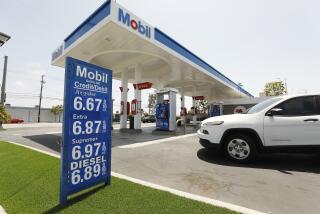Angelides Offers Plan to Require Fuel-Efficient Cars
Laying out an environmental agenda he hopes to pursue as governor, state Treasurer Phil Angelides on Thursday proposed cutting California’s oil consumption by 25% over 10 years with a plan that would require all new vehicles sold in the state to be able to run on a mix of gasoline and alternative fuels.
To accommodate the new vehicles, the Democrat would require oil companies to convert filling-station pumps to sell blends of gasoline and bio-fuels, such as corn-based ethanol. The state and every local government in California would serve as a model for consumers: all vehicles bought by public agencies for their fleets would have to be highly fuel-efficient, such as hybrids, or run on an alternative energy source. To further cut gasoline use, the state would try to curb suburban sprawl by spurring developers to build housing around mass-transit stops in city centers.
At a Santa Monica news conference with actor and environmental advocate Ed Begley Jr., Angelides said his plan would put California “in the front ranks of clean fuels, clean vehicles, renewable energy, cleaning our air, curbing sprawl and making us a model of sustainability for the world.”
“This will be a real plan -- not just rhetoric,” said Angelides, whose political rivals immediately questioned that claim.
The proposal forms a key plank of Angelides’ campaign against state Controller Steve Westly in the June primary for the Democratic nomination to challenge Gov. Arnold Schwarzenegger in November.
All three candidates cast themselves as champions of the environment. Westly’s recent campaign stops in Northern California have included visits to a solar-powered sewage treatment plant and a Humboldt County marsh where a campaign ad crew filmed his visit with environmental advocates. Like Angelides, Westly has supported steps by the state’s giant pension funds to invest in alternative energy sources and combat global warming.
In the general-election contest, the Republican governor is likely to tout his environmental record in appealing to the coastal Democrats and independents whose support he needs to win reelection.
Schwarzenegger has set ambitious targets for cutting California’s greenhouse gas emissions and proposed building a statewide network of 200 hydrogen filling stations by the end of the decade to help wean the state from gasoline.
The Angelides plan drew a scathing reaction from Westly’s top campaign strategist, Garry South. He dismissed the proposal as an attempt by Angelides to inoculate himself from the political damage he stands to suffer in the months ahead as voters learn of what South portrayed as Angelides’ dismal environmental record as a Sacramento developer in the 1980s and 1990s. Namely, South said, Angelides and his partners persuaded politicians to weaken government flood protections, then paved over wetlands to build thousands of houses.
“He wants to eliminate suburban sprawl now that he’s made his millions on suburban sprawl,” South said. “Now he’s trying to be Mr. Green.”
In Santa Monica, Angelides said he was “always at the front edge of environmental innovation” as a developer. He cited his projects on the outskirts of Sacramento with energy-efficient homes, narrow tree-lined streets, mixed housing types, express bus service and, in one case, a light-rail train station.
“I’m very proud of what I did in the private sector,” he said.
The Angelides plan also drew a chilly response from Schwarzenegger’s political team.
“Mr. Angelides’ newfound interest in environmental issues stands in strong contrast to the governor’s long record of achievement and his reputation nationally and internationally as a leader in this area,” said Katie Levinson, communications director of the governor’s reelection campaign. “It will take more than empty rhetoric from Mr. Angelides to protect our natural resources.”
Those battling over environmental rules had, predictably, different reactions.
Rico Mastrodonato, Northern California director of the California League of Conservation Voters, welcomed the concept of cutting the state’s reliance on gasoline to cut pollution. While declining to address the plan’s specifics, he said both Angelides and Westly “have excellent environmental credentials,” whereas Schwarzenegger has been “long on rhetoric and short on substance.”
Eron Shosteck, a spokesman for the Alliance of Automobile Manufacturers, said there were roughly 5 million clean-fuel vehicles on U.S. roads, and automakers expected to produce 1 million more this year. Responding to Angelides’ plan, he said: “Mandates are not necessary because the market is moving in that direction without a push from government.”
Frank Maisano, a lobbyist for energy companies in Washington, D.C., said the Angelides mandate of new filling-station pumps for alternative fuels would lead to higher gas prices at a time when fuel costs already are soaring.
“Any time you start restricting the type of cars people can choose from, and mandating the kind of fuel that manufacturers have to make to put into those cars, you’re talking about adding costs,” Maisano said. “And that is never good for the consumer.”
An Angelides spokesman said his plan would give Californians more choices in cars and fuel, leading ultimately to lower prices.
More to Read
Get the L.A. Times Politics newsletter
Deeply reported insights into legislation, politics and policy from Sacramento, Washington and beyond. In your inbox three times per week.
You may occasionally receive promotional content from the Los Angeles Times.











